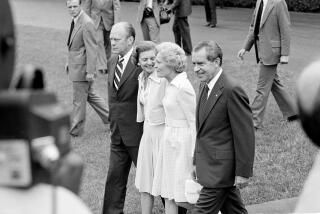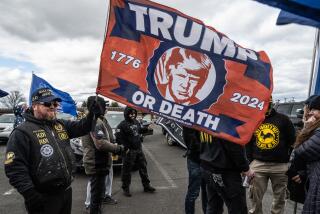Op-Ed: Who behaves like Trump? Deviants. And delinquents.
Now in control of the House, Democrats armed with committee control and subpoenas probably will intensify their conflict with President Trump, digging into his personal scandals, business deceits and even the tax returns he’s kept secret. Under this pressure, will Trump be held in check or will he get worse?
The answer resides in the president’s personality. More than Trump’s bombast or even lies, this is what continues to truly worry people. The concern is at a level on par with President Nixon’s darkest days.
What type of president looks at 14 mail bombs sent to public figures and 11 worshipers killed at a synagogue and gripes that these events disrupted his political momentum? Who would echo history’s worst leaders by calling the press “the true enemy of the people” and call migrants walking toward the U.S. an “invasion?” How does a man entrusted with the world’s highest office make 30 false or misleading claims every day?
As author of the most recent Trump biography, I’m repeatedly asked questions like those. In reply I rely on two old-fashioned terms. When it comes to his character, Trump is a deviant. When it comes to his conduct, he is a delinquent.
Influential deviants exert a downward pressure on social norms.
Even as a child in the 1950s Donald Trump showed a stubborn tendency to deviate from the very principles that underpin civilization. Trump explained to me in an interview that he felt most people are “not worthy of respect,” and this was the attitude he would carry through life. He never felt that the rules applied to him or that he should take responsibility for any harm he caused.
Trump’s deviant personality naturally led to delinquent behavior, including giving a teacher a black eye and continually refusing to comply with basic rules. “I was a very rebellious kid,” Trump told me. “I loved to fight.” More concerning was Trump’s suggestion that he hasn’t changed since first grade. “The temperament,” he revealed, “is not that different.”
Fred Trump, his father, became so worried about his behavior that he sent 13-year-old Donald to military school. In those days New York Military Academy was, for kids like Trump, an alternative to a juvenile detention facility.
At the military academy Trump started out as defiant, especially compared with those he described as “normal kids.” When he conformed, he did it to manipulate. His mentor at the school said that Trump was the most “conniving” kid he ever met. After a baseball game, for example, he demanded a younger schoolmate agree that he had hit a home run that never happened. The boy, feeling the pressure, complied.
An adult Trump began his career by submitting unsigned contracts to get his first development project approved. He posed as other people on the phone to spread flattering stories in the press. Cheating, lying — he considered this stuff innocent fun. Once he was able to capture press attention at will, he made cruelty and disruption hallmarks of his public persona. As New York Mayor Ed Koch called for calm after the assault on a jogger in Central Park shocked the city, Trump ran newspaper ads calling for the death penalty for those (wrongly, it turned out) accused of the crime.
Delinquents often find their deviance to be profitable. They create organizations governed by alternative norms — think gangs, pyramid schemes, Trump “University” — and can frighten bystanders into setting aside their own values to seek safety. Shopkeepers pay protection money. “Never Trump” senators now act as the president’s rubber stamp and cheering section. This is a risky proposition, as the forced resignation of Atty. Gen. Jeff Sessions shows. Otherwise loyal, Sessions rightly recused himself from the matter of Russia’s election meddling and was tormented by Trump.
Enter the Fray: First takes on the news of the minute from L.A. Times Opinion »
In most cases deviance like Trump’s is discouraged by family, friends and communities. However, when it manifests in a billionaire who is ever present in the media, deviance can seem acceptable and even advantageous. Influential deviants exert a downward pressure on social norms. This is what the late Sen. Daniel Patrick Moynihan of New York wrote about in his landmark 1993 essay, “Defining Deviancy Down.” Moynihan argued that when deviance is accepted, people become accustomed to awful behavior in their midst — think of Trump’s name-calling — and begin to believe it’s not so bad. Under these conditions we won’t become alarmed unless something worse occurs.
Add the fact that deviance in any context can provide a secret thrill to people who think, “I wish I had the nerve to say that,” and you get a sense of how Trump not only gets away with ignoring all social and political norms but also thrives by doing so. Trump’s power flows from his refusal to conform — and he clearly knows that’s the case. Consider that when he declared himself a “nationalist” he specifically pointed out that “we’re not supposed to use that word.”
What many Americans feel right now is what families challenged by a deviant child veering into delinquency experience. Exhausted by awful behavior, the temptation is to respond in kind but that almost always backfires. The better solution generally involves turning to institutions created to help — the police and the courts — and in many cases they can offer protection and even recovery for the troubled kid.
Understanding Trump as a deviant/delinquent, we can hope that he will be countered or contained by strong institutions such as courts, special counsel Robert S. Mueller III, Congress and the press. But it’s not a certainty because no one is willing to go lower in a fight than a deviant who has become a delinquent.
Michael D’Antonio is the author of the biography “The Truth About Trump” and coauthor of “The Shadow President: The Truth About Mike Pence.”
Follow the Opinion section on Twitter @latimesopinionand Facebook
More to Read
A cure for the common opinion
Get thought-provoking perspectives with our weekly newsletter.
You may occasionally receive promotional content from the Los Angeles Times.






